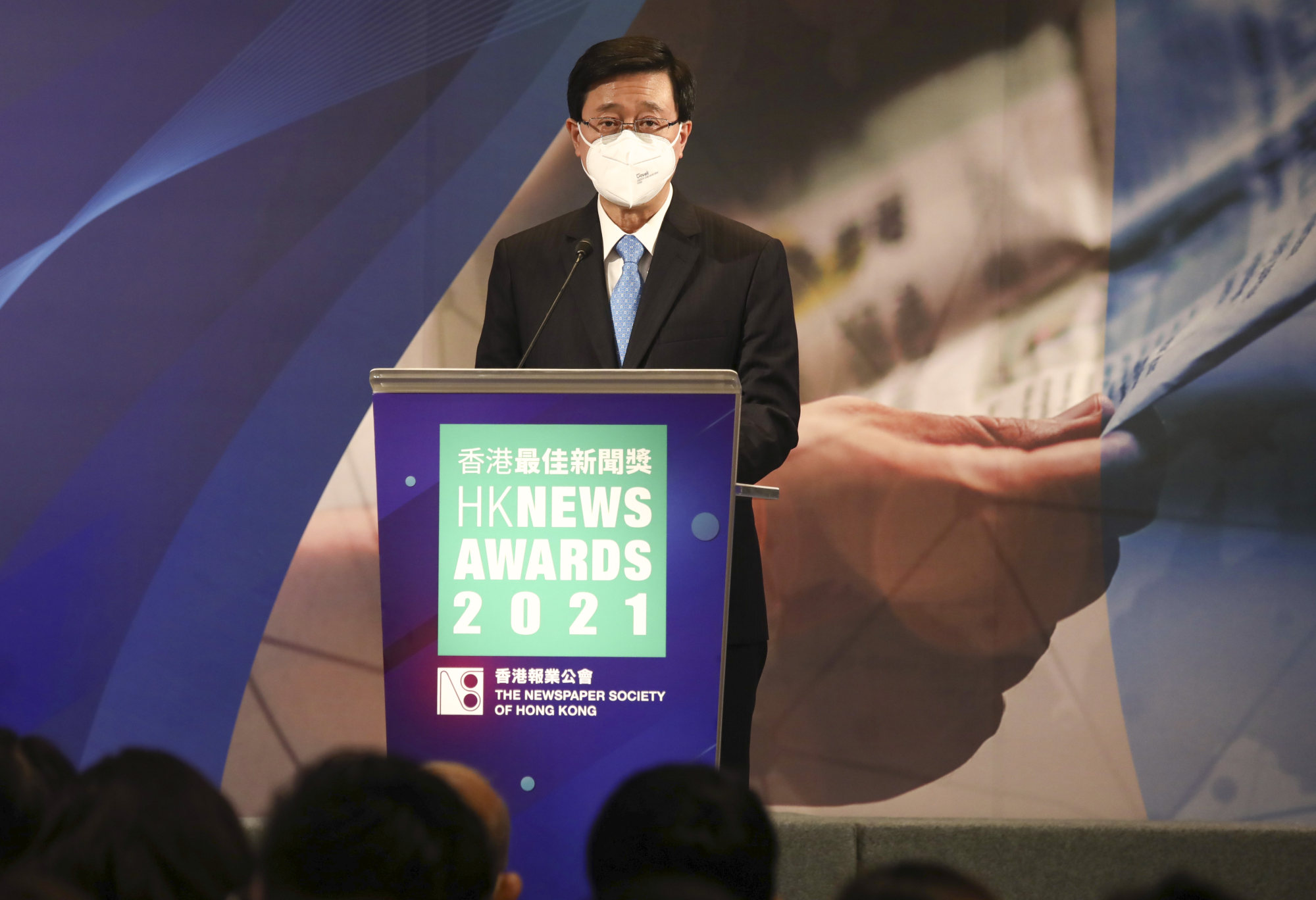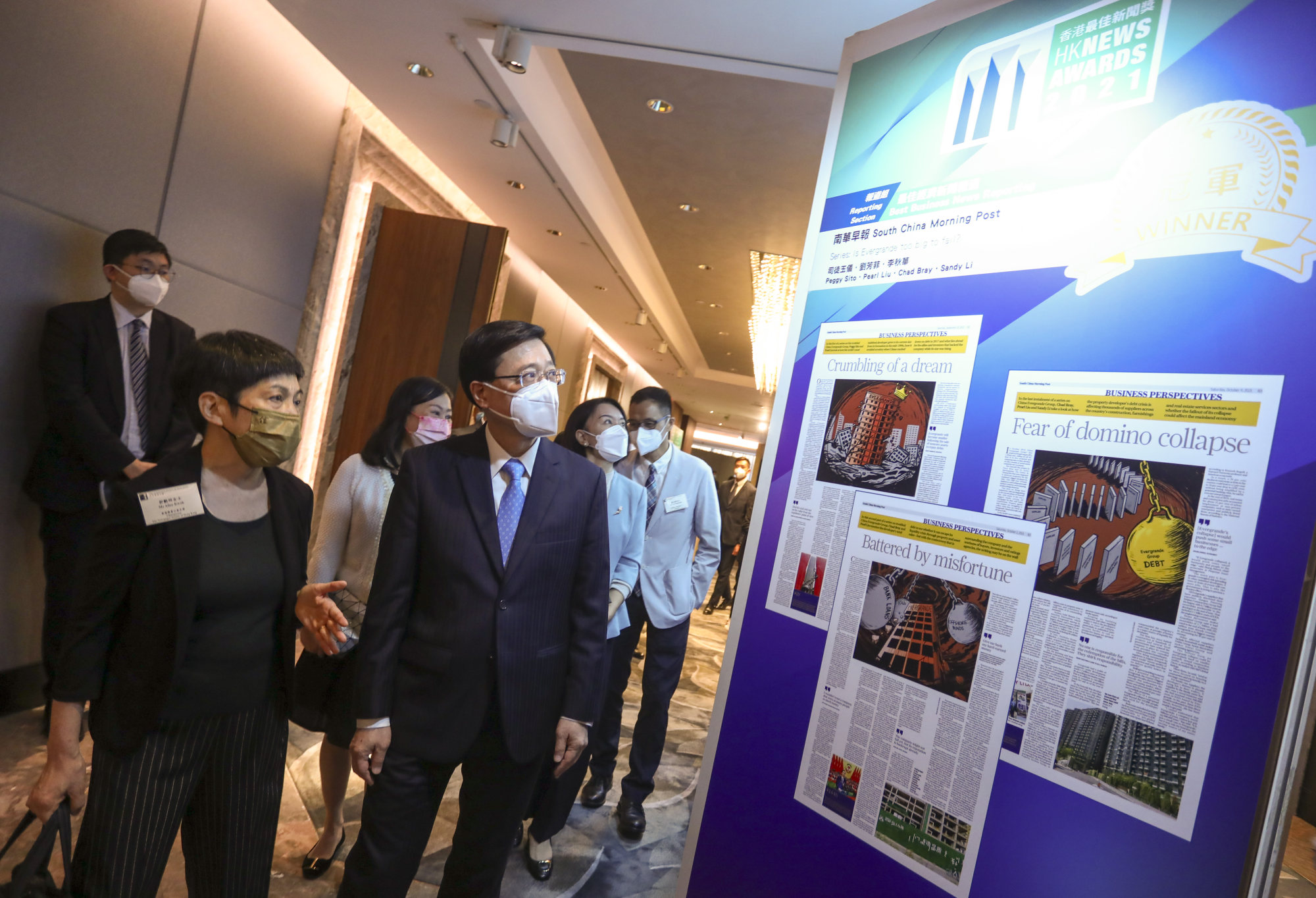
Stay away from ‘destructive forces’ in industry, John Lee warns Hong Kong journalists at media awards ceremony
- Chief executive also urges more coverage of integration plans with mainland China
- He was speaking at the Hong Kong News Awards, with the Post winning nine prizes across eight of 17 categories
Hong Kong’s leader has urged journalists to uphold professionalism so as to win public trust while keeping a distance from “destructive forces” in the industry that endanger national security.
In a speech at the Hong Kong News Awards on Friday, Chief Executive John Lee Ka-chiu praised the professionalism of the journalists who won at the event, while hitting out at black sheep in the industry, without naming any organisation.
“In the past years, some people used journalism as a tool for achieving their own goals or political gains, or used journalistic work as a pretext to endanger national security,” Lee said. “The government certainly has the responsibility, in accordance with the law, to combat the destructive forces that polluted journalistic work.
“These people were engaging in illegal activities in the disguise of news reporting. Genuine journalists should keep a distance from those who commit illegal acts,” he added.

The city leader assured the audience that press freedom had been guaranteed by the Basic Law, the city’s mini-constitution, and urged the media industry to tell Hong Kong’s stories well.
Lee said the city’s integration with mainland China in the next five years would provide journalists with “endless reporting topics”, as Hong Kong would be aligned with the country’s strategic development and make efforts to establish itself as an international innovation and technology centre, as well as a hub for cultural and art exchanges.
Citing Chinese President Xi Jinping’s expectations laid down in his visit to the city earlier this month, Lee appealed to journalists to uphold professionalism and present factual, objective, impartial and ethical coverage to win public trust, adding he read multiple newspapers in both soft and hardcopy daily, and was a reader who enjoyed the scent of ink.
Xi, in his July 1 visit, said everyone living in Hong Kong, regardless of their profession or belief, was a positive force for development and could contribute to the city, as long as they genuinely supported the “one country, two systems” policy, loved Hong Kong and abided by the Basic Law and local legislation.
Campaigners tell UN that Hong Kong national security law hits freedom
The Hong Kong News Awards, organised by the Newspaper Society of Hong Kong, honours media workers with the aim of enhancing professional standards. This year, the group received 619 entries from Chinese and English local media outlets.
The Post scooped up nine awards for design, reporting and photography, including best business news reporting and best page design in both the single and series divisions, in eight of the 17 categories.

The Post also won first runner-up in best news page design (single page) and best business news writing. It was second runner-up in best English news writing and won merits in best news reporting, best science news reporting and best photograph for features.
In a foreword penned by Lee for the ceremony, he said that over the past year, despite “daunting challenges” brought on by the coronavirus pandemic, media workers continued to hold fast to their duties by producing objective reporting and insightful analysis, “informing, educating and entertaining their readers”.
“A vibrant media scene makes enormous contributions to economic and social developments as well as enhancing international competitiveness. This is a prominent mark for not only Hong Kong but also other major cities in the world,” Lee wrote.
He noted that this year marked the 25th anniversary of Hong Kong’s return to Chinese rule, expressing hope that over the next five years, the media industry could make the best use of its influence “in composing a new and fascinating chapter for Hong Kong together” as the city returned to stability and prosperity.
Hong Kong FCC axed human rights press awards to avoid risk of jail
The group said the city experienced an unprecedented setback in 2020 when Beijing imposed the national security law. Two years on, more than 10 journalists from two news outlets have been arrested on charges, including allegedly conspiring to publish seditious material and colluding with “foreign forces.”
In April when Lee ran for the top post without contest, he said there was no need to defend press freedom as it “always existed” in the city.
Earlier this week, Lee said journalists were “in the same boat” as him, expressing hope the news sector would join him in promoting the success of the one country, two systems governing policy to the world.


